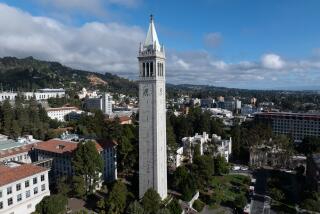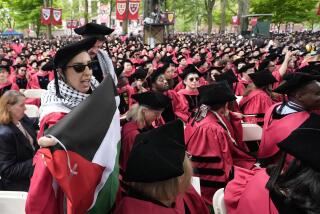Lining Up Scholarly Stars to Change the Universe
CAMBRIDGE, Mass. — In a Harvard seminar room, what students call “the Cornel thing” is in full swing.
The philosopher Cornel West is lecturing. He possesses the air with a zigzag choreography, his elbows move like a marathon runner’s, his jacket flaps flutter as if he were outside, pushing the wind.
West reigns over a tight room where nearly everyone else is sweating. The 40 seats are taken, a half-dozen people are seated on the floor, and a few students are straining to hear from the hallway.
In his raspy voice, West is talking about James Joyce and John Coltrane, Tennessee Williams and Lorraine Hansberry--not necessarily in that order, but all tied in the philosopher’s agile mind to W.E.B. Du Bois’ “construct of modernity.”
Clutching a copy of “The Souls of Black Folk,” Du Bois’ 1903 classic, West suggests emphatically: “It’s rare that an intellectual text received attention from the larger white world.”
It is happening again and it is happening right here.
Through the power of money and mission, Harvard is gathering many of America’s most prominent black intellectuals and shining a spotlight on them. Du Bois would smile at the rapt attention his words are getting here, where he walked Harvard Yard a century ago. In his spirit, the university’s Department of Afro-American Studies is being expanded and revived.
For almost five years, Henry Louis Gates Jr.--the scholar known as Skip--has been at the helm of the department as well as its companion Du Bois Institute for Afro-American Research.
Gates, a widely published cultural critic and English professor, has been an aggressive and deliberate coach, revitalizing a once-lifeless department. The first big step was his decision to settle here after appointments at Yale, Cornell and Duke. Then he persuaded West--who already had accomplished the seemingly impossible by making black-defined philosophy a marquee commodity--to leave his own chairmanship at Princeton.
Gates brought Kwame Anthony Appiah, a philosopher and novelist, from Duke. He recruited historian Evelyn Brooks Higginbotham from the University of Pennsylvania. As luck would have it, her husband, the esteemed jurist and author Leon Higginbotham, was retiring and took a place at Harvard’s Kennedy School of Government.
And now another coup: After 25 years at the University of Chicago, the distinguished sociologist William Julius Wilson is moving to Harvard.
“You can’t beat that,” says Gates.
In terms of critical mass, Gates is assembling the most prestigious group of black intellectuals since Thurgood Marshall gathered his team three decades ago to research and argue Brown vs. Board of Education. And it raises several questions. First, can the Harvard team bring its scholarly prowess to bear on national issues in a tangible way? Or is this the ebony answer to the ivory tower?
“We have a right to expect something from them in terms of solutions, some infusion of ideas that can turn into public policy, some answers to the very vexing problems we have--from freedom of speech and rap music to how do we deal with the AIDS crisis,” says Frank Matthews, a senior scholar at George Mason University and publisher of Black Issues in Higher Education. “We have a right to expect more than business as usual.”
Second, can Harvard’s Afro-American studies department achieve stability and respect after a quarter-century of debate over its role and place in this bastion of the traditional establishment? Can a multidisciplinary degree from a multicultural department hold its value in the marketplace?
“We hope having a strong department here will help the racists from the cultural and political right . . . to understand how important Afro-American studies is to an understanding of a multicultural America,” Gates says.
And though only 77 of Harvard’s 2,000 full-time faculty positions are held by African Americans, they are an increasingly prominent group. There are psychiatrist Alvin Poussaint and neurology professor and explorer Allen Counter at the Harvard Medical School; Charles Ogletree, Randall Kennedy and Christopher Edley in the law school; Sara Lightfoot in the education department; Orlando Patterson in sociology; and Martin Kilson in history.
If any university is grand enough to sustain a galaxy of stars, it would surely be Harvard, America’s oldest and richest university.
*
Gates, 45, a compact man with inquisitive eyes behind barely rimmed glasses, is euphoric. His department is robust, with students signing up in droves and scholars checking in like clockwork. His mission--to refine black studies as an academic, not a politically slanted, specialty--is underway.
“Fundamentally, everybody is excited,” he says. “For Harvard, it’s a miracle.” For a long time, Harvard’s African American aspect was out of focus. Many felt the “Afro-Am” department, founded in 1969 as a product of that turbulent time, was underemphasized, underfunded and low among the school’s priorities.
“Nationally, when people looked at Afro-American studies, they didn’t look to Harvard,” says Higginbotham.
By 1990, the department was down to one professor; scholars kept turning down appointments. Encouraged by former Harvard law professor Derrick Bell, a long-standing critic of Harvard’s shortage of minority faculty members, students launched a protest.
Harvard President Neil Rudenstine lured Gates from Duke with the promise of scholarly and financial support. The university is flexible in accommodating the interests of black intellectuals, often through joint appointments to the faculties of more than one department. In four years, with help from Harvard’s fund-raising machine, Gates has attracted $6.2 million to support his department, including $2.5 million in endowment money.
Rudenstine has nothing but praise for Gates, who, he says, has “played an absolutely vital role in attracting a growing number of outstanding scholars and teachers to Harvard.”
Gates knew a lot of eyes were on him. When he took the job, Brown University President Vartan Gregorian told him: “It’s important you succeed. During your first year, if you cross the street, cut a ribbon.” In other words, make a big splash.
He adopted a two-step plan of attack.
“We had to establish a track record, first in the humanities, and then tackle public policy,” he says. That design first brought in West, 42, and now Wilson, 60--and created what Gates blithely calls the “Dream Team” of black public intellectuals.
Talent seems to attract talent, and everyone seems drawn to the buzz. The electricity was partly responsible for Wilson’s decision to leave Chicago for Cambridge after four years of lobbying by Harvard.
As recently as last year, Wilson had turned down an offer from Harvard’s sociology department. Then Gates cornered him last year at dinner at Vice President Al Gore’s house, and invited him to Boston. There, Gates put on an impressive dinner in Wilson’s honor.
“Boy, he had everyone there,” says Wilson of the phalanx of black scholars. “It was one of the most stimulating evenings I had ever spent. And my wife said, ‘I have never seen you so excited.’ Then I knew I had changed my mind.”
Gates’ arrival, and the changes since, have begun to give the African American studies major a new heft. Students are taking it more seriously than before. Before Gates, “we thought it was a nice idea, but concentrating in it didn’t seem viable,” says Mecca Nelson, a former student now in the university’s development department who was part of the protest in 1990. “Now the center of gravity for black studies has switched to Cambridge,” she says.
Every day Gates walks past several likenesses of Du Bois, a Fisk graduate who, in 1896, became the first black person to earn a PhD from Harvard. But he also walks past the pictures of five men and women who struggled to shape his department since its founding.
He has tried to weave African American studies into the fabric of Harvard. Every appointment in his department has been made jointly with another department--West and Higginbotham with the divinity school; Wilson will have ties to at least four different entities.
“You achieve a certain end with a joint appointment,” Gates explains. “You build a core constituency within the field of African American studies, and simultaneously you have the possibility of transforming those traditional disciplines--so that the history department thinks it is incomplete until it teaches Afro-American history, so that the English department thinks it is incomplete until it teaches literature created by black women.”
But while they are spreading out through the Harvard fiefdoms, the Afro-Am professors are tackling other projects together. All of them are board members of the Du Bois Institute, which is dedicated to supporting projects in the spirit of Du Bois.
West says he hopes Harvard’s Afro-Am department can reflect what he sees as a new spirit in black America, one of resilience and resistance.
“On one hand, it is open season on us,” he asserts. “On the other hand, we have got to be creative in our response--intellectual, political, economic.”
In that sense, what’s going on at Harvard is part of a very big picture.
More to Read
Sign up for Essential California
The most important California stories and recommendations in your inbox every morning.
You may occasionally receive promotional content from the Los Angeles Times.










